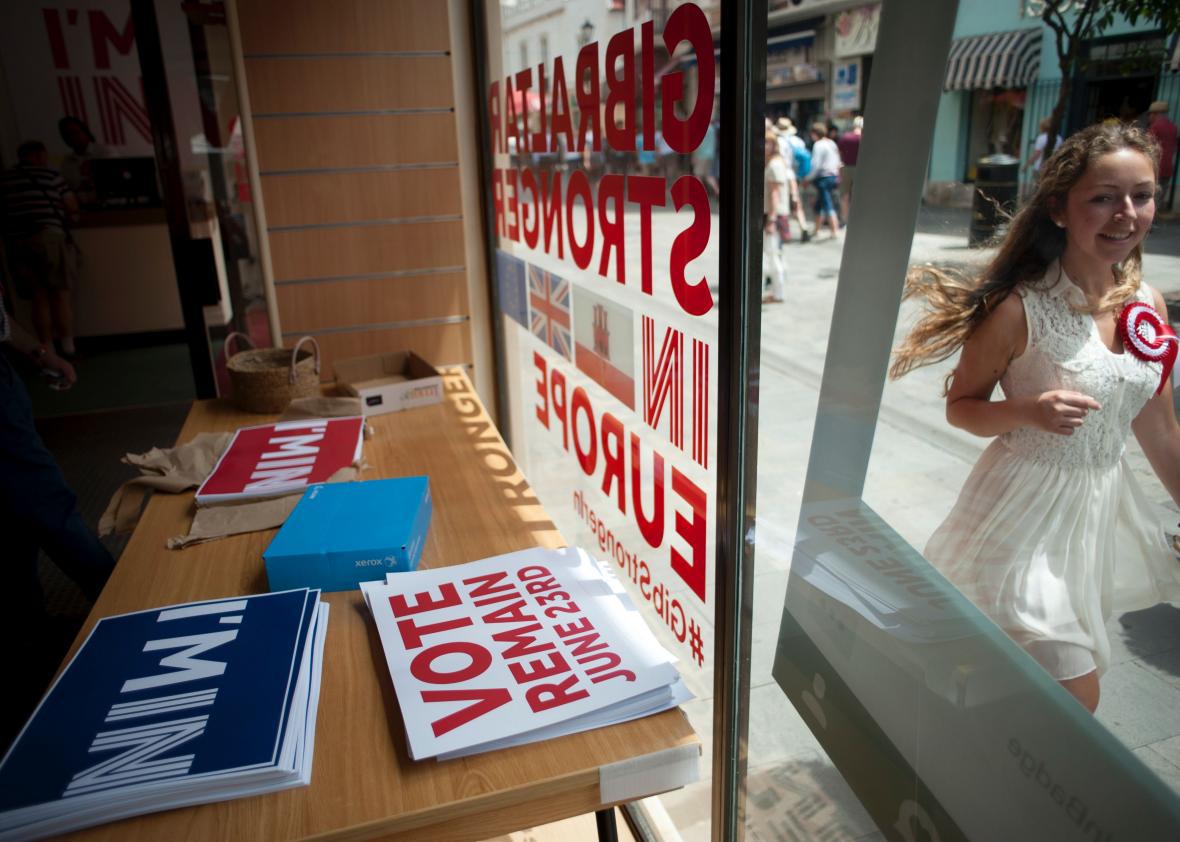The United Kingdom’s decision to #Brexit the European Union on Thursday will have far-reaching effects on economies, politics, and environmental well-being around the globe. As in all geopolitical turmoil, women will bear a disproportionate share of the burden of change as their rights and protections hinge on a U.K. untethered from a progressive, stabilizing force.
In the Telegraph last week, feminist journalist Caroline Criado-Perez outlined the many steps toward gender justice the EU has fomented in the U.K. over the past few decades. In matters of employment rights, sexual harassment, and equal pay, the EU has prodded the U.K. time and time again to do better by its women. Once the nation is no longer subject to the broader protections the EU requires, women of the U.K. may see their country regress on issues integral to their prosperity and fair treatment.
The U.K. passed the Equal Pay Act in 1970, but that piece of legislation only ended wage discrimination against women who were doing the same exact jobs as men. In 1982, the European Commission brought the U.K. in front of a judge to force the nation to comply with a pan-European treaty that demanded equal pay for work with equal value. In her piece, Criado-Perez invokes the example of women cleaning offices and men cleaning streets: Without European intervention, the former could still legally be paid less than the latter.
On matters of working hours and paid leave, the U.K. has often instated more generous minimums than required by the EU. But when the nation leaves the EU, it won’t be bound by the increasingly progressive benefits the EU requires. Legislation passed in the U.K. in the ‘70s and ‘80s granted guaranteed maternity leave for all full-time, directly employed workers who’d been at their jobs for two years or more. It wasn’t until an EU directive proposed in 1992 that the U.K. was forced to extend paid parental leave to all working mothers, and later, to fathers.
It was thanks to the EU that laws against sexual harassment in the workplace first came to the U.K, where it had previously been a matter of case precedence. The EU has also offered more comprehensive protections against employment discrimination than the U.K. has alone. Before the European Court of Justice declared it sex discrimination in a 1995 U.K. case, a U.K. woman could be fired from her military job for becoming pregnant.
Brexit advocates have suggested that one of their first actions post-departure would be to reinstate caps on how much compensation victims of sex discrimination could claim from employers. Before the EU banned such caps, some U.K. companies would risk paying women less and take the fine if they had to, since it would still be cheaper. Proponents of the EU departure have also pledged to slash protections and benefits for contract and part-time workers to create a more “flexible labour market.” These benefits, including maternity leave, were guaranteed by the EU once a court deemed that the U.K.’s preference for full-time employees was de facto sex discrimination, since part-time workers were disproportionately female.
Sophie Walker, the head of the U.K.’s Women’s Equality Party, notes that women’s work will be particularly vulnerable during the recovery from the recession that Brexit has wrought. “Every recession that this country has endured has prompted the same response from government: to slash spending on women’s jobs—the public service workers—and throw panicky pots of money at big infrastructure developments, construction, building—jobs for the boys,” she wrote in the Telegraph on Friday morning.
And that’s all just when it comes to employment. The U.K.’s membership in a multi-state union meant pressure to enact stronger and broader prohibitions against gender-based violence, too. The U.K. signed the EU’s Istanbul Convention, written to address violence against women and girls, in 2012. The country never ratified it, though, despite prime minister (for now) David Cameron’s promise to do so in 2014. Now, it probably never will. “Our EU membership gives us a benchmark to hold the government to account,” wrote Polly Neate, chief executive of Women’s Aid, a few weeks before the Brexit vote. “We are among the wealthiest countries in the EU; we should compare favourably in terms of support for survivors. While we are members, this argument is hard to dismiss.”
U.K. women will inarguably enjoy fewer protections under the law once their country departs the EU. But women across the continent will feel the destabilizing effects. Since at least 1993, women have made up the majority of the U.K.’s migrant population. Many of them left their home countries to escape gender-based violence, abusive partners, or a dearth of employment opportunities for women, bringing children with them to find a better life in the U.K. After Brexit, women like them will find their list of options one major line shorter.
